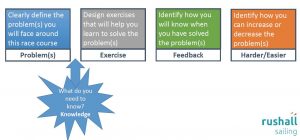
Reflections on coaching styles
“Tell me and I will forget, show me and I may remember; involve me and I will understand.”
There is nothing truly new in coaching, and our experience at the receiving end of some coaching this summer inspired me to research the origin of this highly relevant quotation: it is seriously old: the oldest credit I could find is to Confucius himself in 450 BC.
Liz, her brother Tom, and I signed up to take our “Yachtmaster Offshore” practical: a fast-track version with three days “revision” and two days examination.
The revision coach was a lovely and well respected “old school” coach: hugely experienced, always time to demonstrate and explain everything to the nth degree, he certainly taught us some new techniques that we would never have found through experimentation on our own 1960’s classic cruiser.
The exam situation had a completely different feel: necessarily we were set a series of problems that we were each left to solve on our own (so long as we didn’t hit anything!). The only feedback was the outcome of the exercise itself (and the length of the notes we could see our examiner making while we attempted each task!). More stressful: yes of course: the outcome of the qualification was at stake, and when things felt like they were not going to plan there was no calming hand on the tiller or wise words of advice. Of course: the exam was not intended to be a learning experience… or was it?
My observation is that little has changed since Confucius spoke. Teaching by rote is fine so long as every future situation is identical in every respect to the taught one, and the learner is engaged enough to put his/her own meaning on it. But change one variable (or subtly change the question), and a non-understanding learner will not be able to complete that task unaided: he’s learnt nothing!
Despite the fact that we had no direct feedback until the examination period was complete, I learnt plenty more through the problem setting period. It was my responsibility to define the problem, sift through the options, make some decisions, and fine tune (or abort and start again) if my solution did not achieve the desired outcome. Thank you to James Pearson for giving us the opportunity to be responsible for our own learning!
Aspiring coaches: please feel free to give this simple model a go if you want to test for yourself whether you can use a problem setting approach to your coaching.

Photo credit: David Harding


